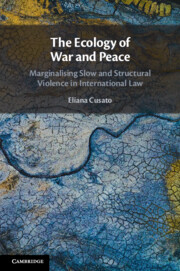Book contents
- The Ecology of War and Peace
- The Ecology of War and Peace
- Copyright page
- Contents
- Acknowledgements
- 1 Introduction
- Part I Concepts, Theories, and Debates
- Part II The Practice of International Law
- 4 War Crimes Tribunals and the International Court of Justice: Nature between Property Protection and Humanitarian Concerns
- 5 The United Nations Security Council
- 6 Truth Commissions
- 7 Conclusion
- Bibliography
- Index
7 - Conclusion
Towards a Political Ecology of International Law
from Part II - The Practice of International Law
Published online by Cambridge University Press: 03 September 2021
- The Ecology of War and Peace
- The Ecology of War and Peace
- Copyright page
- Contents
- Acknowledgements
- 1 Introduction
- Part I Concepts, Theories, and Debates
- Part II The Practice of International Law
- 4 War Crimes Tribunals and the International Court of Justice: Nature between Property Protection and Humanitarian Concerns
- 5 The United Nations Security Council
- 6 Truth Commissions
- 7 Conclusion
- Bibliography
- Index
Summary
The final chapter brings together the main findings and arguments of the book, identifies its broader implications, and formulates some ideas for future research. Building upon insights from political ecology, it suggests that a useful way forward is through reframing questions away from assuming fatalistic relationships between nature and conflict, and starting to ask questions that illuminate the broader social/political/economic dynamics involved. By considering how different environmental injustices play a role in shaping contemporary conflicts, international law scholarship may also expose and challenge the utilitarian/instrumental view of nature that underpins the field. If environmental ‘scarcity’ and ‘abundance’ are not external factors leading to conflict, but the outcomes of socio-economic processes, often linked to historical grievances and unequal power relations, entirely different notions of justice, peace, and security are needed.
Keywords
- Type
- Chapter
- Information
- The Ecology of War and PeaceMarginalising Slow and Structural Violence in International Law, pp. 231 - 242Publisher: Cambridge University PressPrint publication year: 2021

